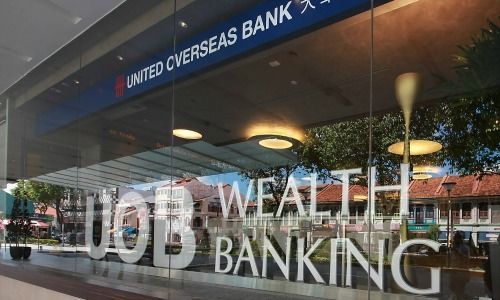UOB Earnings Hit By Declining Interest Rates
UOB's Q1 2020 net earnings are down 15 percent on-quarter and down 19 percent on-year, hit by declining margins and higher credit costs.
UOB reported a quarterly profit of S$855 million, down from $1.05 billion a year before, and total income of S$2.41 billion, down 1 percent on-quarter and flat on-year despite a lower interest rate environment and slowing business momentum towards the end of the quarter resulting from the Covid-19 pandemic, according to its earnings release on Wednesday.
Compared to Q4 2019, net interest income fell 3 percent to S$1.59 billion, despite loan growth of 4 percent, due to lower interest rates. Non-interest income grew 2 percent to S$813 million, boosted by growth in loan-related and wealth management fees. Treasury and investment income was relatively flat, and total operating expenses decreased by 3 percent.
However, the bank increased total impairment charges to S$286 million as a result of the challenging macro environment, up from $93 million a year before.
Strong Balance Sheet
UOB said it is maintaining a strong balance sheet amid challenging economic conditions, with an additional allowance of S$546 million to strengthen coverage this quarter. Its Common Equity Tier 1 (CET1) ratio remained strong at 14.1 percent, 0.2 percentage points lower on-quarter.
«In times such as these, we ensure our balance sheet remains strong and our capital and liquidity positions robust, so we can continue to support our customers through the roughest of cycles and crises…we are confident that we will ride through these extraordinarily difficult times and emerge stronger,» Wee Eee Cheong, deputy chairman and CEO, said in the announcement.
Last month, Wee said in a statement that the bank, which employs over 24,000 people, is not planning any layoffs this year.
Providing Liquidity During Covid-19
UOB said that it had approved S$4 billion in loans under the Temporary Bridging Loan Program since the government increased its risk share of such loans to 90 percent a month ago, the bank announced in a statement on Tuesday
The funds were disbursed to mid-sized enterprise clients in sectors, which have been hard hit by the Covid-19 pandemic, including construction, consumer staples, retail and hospitality.
UOB is the first bank to make use of the Monetary Authority of Singapore (MAS) SGD Facility for Enterprise Singapore (ESG) Loans, and will pass on the savings fully to customers, it said in the statement.



























